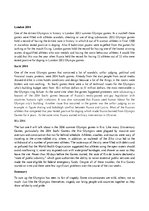-
The Worst Olympics - Public Speech
Rio 2016
The last one I will talk about is the 2016 summer Olympic games in Rio. Like many 21st-century Games, particularly the 2014 Sochi Games, the Rio Olympics were plagued by massive cost overruns and construction that ran far behind schedule. Athletes, coaches, and tourists were wary of traveling to the crime-riddled city, where, in addition, an outbreak of the Zika virus led to the withdrawal of a number of prominent athletes. The waterways of the city were filled with debris and so polluted that the World Health Organization suggested that athletes using the open waters should avoid swallowing it, cover any exposed cuts with waterproof bandages, and shower as soon as they leave the site. Fewer than 50 days before the Games started, the state of Rio de Janeiro declared a “state of public calamity,” which gave authorities the ability to ration essential public services and made the state eligible for federal emergency funds. Despite all of these troubles, the Rio Games started on time and there were few significant problems over the course of the two weeks.
Summary
To sum up the Olympics has seen its fair of tragedy. Some circumstances are mild, others, not so much. Just like the Olympics themselves, tragedy can bring people and countries together as they show solidarity and pride.
…
London 2014 One of the dirtiest Olympics in history is London 2012 summer Olympic games. In a nutshell these games were filled with athletes scandals, cheating or use of drug substances. 2012 Olympic games hold a record of having the dirtiest race in history in which 6 out of 9-woman athletes in final 1500 m marathon tested positive in doping. Also 8 badminton payers were expelled from the games for tanking or for the match-fixing. London games hold the record for having one of the lowest winning scores, disqualified athletes who won medals and having the worst behaviour athletes. I would like to add that this was the year when Russia held the record for having 12 athletes out of 32 who were tested positive for doping in London 2012 Olympic games. Berlin 1936 Now that you're aware of the overview, let's begin with 1936 Summer Olympic Games that took place in Germany, Berlin. The Olympic Games were held in a tense, politically charged atmosphere because the Nazi Party had risen to power in 1933. It was known by a fact that Nazi Germany used this for Propagandas purposes. However, these games are best remembered for Adolf Hitler’s failed attempt to use them to prove his theories of Aryan racial superiority. As it turned out, the most popular hero of the games was the African-American sprinter and long jumper Jesse Owens, who won four gold medals in the 100m, 200m, 4x100m relay and long jump. Though the Nazi flag was everywhere, Hitler's anti-Semitic and racist policies were largely camouflaged from foreign guests — "Jews Not Welcome" signs were removed from all public places and popular destinations. Despite all of that Germany gave a great impression of the host country. Sarajevo 1984 Another Olympic game that showcases why people shouldn’t mix political conflicts with the sports are Winter Olympic Games in Sarajevo in 1984. That year, the unlikeliest of candidate cities in the unlikeliest of candidate countries did what many had thought impossible: it hosted an international sports competition at the highest level, housing and feeding hundreds of athletes and thousands of tourists while broadcasting a positive image of socialist Yugoslavia to the world. Despite the success that the games had it is the aftermath of the Bosnia War that made this place a battlefield and an Olympic landmark left in ruins. Thirty years later, the symbols of the Olympics are still present in Sarajevo. The mascot "Vučko" (the pet wolf) is now the biggest selling souvenir for tourists, and its faded image can still be seen on the façades of several buildings. Road signs point to "the Olympic mountain", people like to talk about it and many, sighing, remember the times when "we were happy and united". Summary To sum up the Olympics has seen its fair of tragedy. Some circumstances are mild, others, not so much. Just like the Olympics themselves, tragedy can bring people and countries together as they show solidarity and pride.




